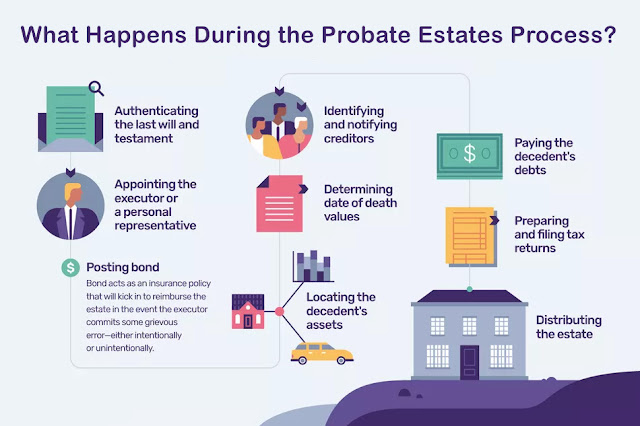Probate Estates
is a court-supervised procedure for certifying a last will and testament if the
deceased is made one. It involves identifying the value of the Deceased Estate and determining it,
paying its final bills and taxes and finally, distributing the remaining
portion of the property to its true beneficiaries.
What is Probate Estates
Probate is a formal action to establish the validity of the
dead person's will. A Probate Estates has the property of a dead person, which requires the
appointment of a fiduciary.
Probate Estates
has been titled only in the name of deceased. Probate property may include any
kind of property, including: contract for real estate, bank accounts, brokerage
and investment accounts, promissory note, deed, stock etc. In addition, the
real estate probate is included in rental of tenants in estates. However, the
property held in joint tenancy with the right to survive has been excluded from
Probate Estates.
Probate SA Process - When is it necessary?
Each state has specific laws to determine what is there to
determine the property. These laws are included in the law for "probate
codes," as well as "inheritance of intestines", when a decent
dies without a Wills.
Probate still needs to pay the final bills of the deceased and distribute it to his property, when he dies. Although the laws governing Probate Estates may vary in different states, but the steps involved are usually very similar to whoever it is.
Probate still needs to pay the final bills of the deceased and distribute it to his property, when he dies. Although the laws governing Probate Estates may vary in different states, but the steps involved are usually very similar to whoever it is.
Authenticating the Last Wills and Testament
In most states, there are laws that require that anyone who
is in the custody of the deceased Wills
have to appear in the appropriate court as soon as possible. An application or
petition to open the Probate Estates
is usually done at the same time. Occasionally it is necessary to file a death
certificate with desire and petition.
Completing and presenting the petition is not a difficult
challenge. Many state courts provide forms for this.
If the deceased left the Wills, then the judge will confirm that it is actually valid. This
usually involves the hearing of a court, and the notice of the hearing should
be given to all the beneficiaries listed in the will of the decisive and also
to the heirs - if they do not leave the will, they will be inherited from the
operation of the law.
The hearing provides an opportunity for everyone to object
to Probate Estates - maybe it has
not been drafts properly or because someone is in possession of a recent will.
Someone may also object to the appointment of designated executor in the will
to handle the property.
So how does the court decide if a present will is the real
deal? Many people are called "self-proven pledge". The deceased and
witnesses sign the affidavit at the same time and wills are signed. This is
very good for the court.
However, to cancel this will, one or more witnesses may need
to sign an oath statement or give evidence in court that they had signed the
will and the will in question is in fact the one they saw it.
Choose the right executor for Deceased Estate Administration
As people experience life, they try to get the resources, resources that make up their own domain. Apart from the fact that people build a will so that they can appreciate the reward for such hard work before retirement, they estimate leaving their friends and family and their partner after the succession. At this point, when a person has faith, desire and desire with the intention of allotting his property and property, he can nominate a Deceased Estate Administration in Blackwood Lawyers to manage his plans. While different individuals leave the cases of domain circulation in the court, there are many benefits under the name of the executor of the wills.
Executing or appointing a personal representative
The judge will also appoint an executor, sometimes called a
personal representative or administrator. This person will look into the
probate process and will settle the property.
The choice of the deceased for an executor is usually
included in his will, but if he will not leaves a Will And Powers Of Attorney, then the court will
ordinarily appoint his family or adult children. This person has not been
compelled to serve - he can reject and the court will appoint someone else
again.
The designated executor will receive a "letter
testament" from the court - in a fancy, legal way, he will receive the
document which allows him to work on behalf of the property and make
transactions. This document is sometimes mentioned to as "letter of authority"
or "letter of administration".
Posting Bond
Before it can accept letters and work for the property, it
may be necessary before executing a bond for the executor, although some
testimonies include the provision that it is not necessary. Bond acts as an
insurance policy which will kick in to compensate the property in that
situation, the executor makes some complaint errors - either deliberately or
unknowingly - who financially damage the property, and, in detail, its
beneficiaries.
Beneficiaries can reject this requirement unanimously in
some states, but this is an ironclad rule in others, especially if the executor
terminates any person other than the nominee in Making A Wills or if he remains outside the state is.
Detect Deceased Estate
The first task of the executor involves detecting and
capturing all the critical assets so that they can protect them during the Probate SA process. Sometimes, some
people may also have their own property - some people have their own property,
even to their husband or wife, nobody is told, and these assets are in their
will cannot be distributed.
The executor should hunt for any such property, usually
through review of insurance policies, tax returns and other documentation.
In the case of immovable property, the executor is not
expected to move to a residence or building and stay there during the Probate SA process to
"preserve" it. But he should ensure that property taxes are paid,
insurance is kept, and any mortgage payment is made so that the property is not
lost and not in the foreclosure.
Determination of death values
The date of death values for the property of the deceased
should be determined and it is usually completed through account details and
evaluation. The court will appoint the appraisers in some states, but in
others, the executor can choose anyone.
Many states are required to present a written report to the
Executing Court, list the per-person-owned list along with the value of each Deceased Estates South
Australia, as well as a notation on how to reach that value.
Identifying and Informing Creditors
The identity and death of the creditors of the deceased
should be reported. Most states require that the creditor should publish the
death notice in a local newspaper to alert creditors about which he does not
know.
Generally the creditors have a limited period of time after
getting the notice to receive the property. The exact time period may vary by
state.
The executor can reject claims if he has reason to believe
that they are not valid. The creditor can then file a petition in court that a Probate Office SA judge decides whether
the claim should be paid.
Paying the Decedent's Debts
After this, the claims of those creditors
are paid. The executor shall pay the debt of the deceased and his final bills,
in which the sum of the property includes his last illness, which can be.
Preparation and filing tax returns
The executor will file a final personal income tax return
for the year in which he died. He will determine whether the property is liable
for any property tax, and if so, then he will also file these tax returns. The
taxes payable are made from the property funds.
This sometimes requires liquidation assets to raise funds.
Property taxes are usually within nine months of the date of death of the
deceased.
Distributing Deceased Estate
When all these steps have been completed, the executor can
file a petition in the court for his permission to distribute the named
beneficiaries to the survivors of the Deceased
Estate. This usually requires the permission of the court,
which is usually given only when the executor has presented a complete account
of each financial transaction, which is in the Probate Estates process.
Some states allow the beneficiaries of the property to
collectively collect this accounting requirement if they are all in agreement
that it is not necessary. Otherwise, the executor will have to pay each expense
earned by the property and list and interpret each income. Some states provide
forms to make this procedure a little easier.
If the Will And Powers Of Attorney is
included in the bequests for the minor, the executor can also be responsible
for establishing a trust to accept the possession of the will done on them,
because the minors may not own their property. In other cases and with adult
beneficiaries, deeds and other transfer documents should be prepared and filed
with appropriate state or county officials to finalize the bequests.
"Intestate" Estimate
An intimidating property is that where the deceased has not
left a valid will - either he has never made one or his Wills has not been considered legal by the probate court due to
error in the document or because the successor has successfully contested. The
most important difference is that in the absence of the will, who knows his
wishes, in the order set by the state law, the property of the deceased will
pass to his closest relatives.




Deceased Estate House Clearances & Cleaning in Melbourne. There is no way to appropriately describe what losing a loved one feels likes. For many
ReplyDeleteDeceased estate cleaning
Deceased estate clearing
Deceased estate cleanups
Deceased estate melbourne
Deceased estate repairs